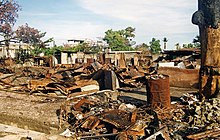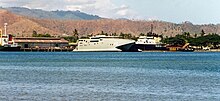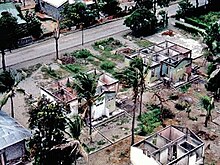Operation thunder

Operation Donner ( Indonesian Operasi Guntur ) was a retaliatory action by the Indonesian military (TNI) against the population of East Timor on the occasion of the positive outcome of the independence referendum in East Timor on August 30, 1999 . The aim of this action planned in July under the name Operasi Wiradharma was that the Indonesian Parliament (MPR) would overturn the referendum in view of the violence. In this last wave of violence by the Indonesian occupation of East Timor, around 1,500 to 2,000 people died. Only an international reaction force from the United Nations ensured that peace and order were restored.
prehistory
Indonesia had occupied the former Portuguese colony since 1975 . After the fall of the Indonesian dictator Suharto and due to increasing pressure from the international community, Indonesia finally agreed to hold a referendum on March 11, 1999, in which the population had the choice between autonomy within Indonesia or complete independence.
procedure

Already in the run-up to the referendum, militias (so-called Wanra ), such as Besi Merah Putih and Aitarak , supported by the Indonesian army and police, began to intimidate possible supporters of independence and the population. On April 6, 1999, pro-Indonesian militias, together with the Indonesian military, carried out the Liquiçá church massacre , in which between 61 and over 200 people died. On April 17, there was a massacre in the house of the politician Manuel Carrascalão , in which at least 14 people were killed. Human Rights Commissioner Mary Robinson expressed great concern about the tense situation.
The referendum of August 30, 1999 finally brought a clear majority with 344,580 votes (78.5%) for the independence of East Timor against 94,388 votes (21%) for the autonomy, with a participation of over 98%. The result was announced on September 4th. A few hours after the announcement, the Indonesian military launched Operation Donner. Together with the Wanras, it began to destroy the infrastructure of the region, hunt down independence activists and drive the population from their homes.

The emerging result fueled the violence of the Wanra. About 250,000 East Timorese were forcibly deported to West Timor. According to the plans of the military backers, they should be further dispersed across Indonesia. Other East Timorese fled the violence in the mountains.
The disappointed opponents of the independence movement, the Wanra and the Indonesian army, massacred people in many parts of the country and left scorched earth behind after their departure . A particularly serious incident was the Suai Church massacre , in which up to 200 people were killed on September 6, 1999. On September 25th, nine people were murdered in Lautém ( "Lospalos case" ). 64 people were killed with machetes and firearms in Passabe . The 745 Indonesian Infantry Battalion from Lospalos left a trail of violence and death as it retreated to West Timor, Indonesia.
Most of the 1,200 to 1,500 people killed by the Indonesian military and militia were killed after the vote. The main target was young men who had worked for UNAMET. 70% of the population had to flee their homes or were forcibly deported by the Indonesians to West Timor, and houses and infrastructure were destroyed. Administrative documents such as land registers, marriage registers, tax and court documents were completely destroyed. The entire holdings of ancient artifacts in the East Timor Museum were brought to Indonesia. According to secret documents that had been sent to the United Nations and FALINTIL, Tavares even issued the order on July 17, 1999, that if the independence referendum was successful, every East Timorese over 15 years of age, men and women, without exception, should be killed.
Deployment of the reaction force
On September 6, the Indonesian Defense Minister General Wiranto declared a military emergency for East Timor. That same night, Indonesia's President Habibie declared martial law in the area by Presidential Decree No. 107 of 1999. Taur Matan Ruaj, after Gusmão number two in the FALINTIL and with the other guerrillairos in the assembly camps, declared on September 7th that he could no longer hold his people back from breaking out and protecting their families. This would have sparked the civil war that the Indonesian military leadership wanted to prevent international intervention. According to the agreement, UN troops were supposed to be stationed in East Timor after the referendum, but Indonesia's Foreign Minister Ali Alatas still refused to accept the peacekeeping forces on September 8th.
On September 8th, Development Minister Heidemarie Wieczorek-Zeul (SPD) was the first German government member to demand the immediate deployment of a peacekeeping force. Foreign Minister Joschka Fischer (Greens) said the next day that Indonesia must now act against mass terror or allow a peace mission. Michael Steiner , foreign policy spokesman for Chancellor Gerhard Schröder (SPD) thought the deployment of a peacekeeping force was still premature. First of all, it is a question of not releasing Indonesia from its obligations. It was just as hesitant as US President Bill Clinton until Australia's Prime Minister John Howard took the initiative. In response to Howard's request for combat troops, Clinton stated that the American military was currently under heavy strain, for example in Kosovo , so that no support could be provided. Howard and Australia's Foreign Minister Alexander Downer then publicly criticized the United States in a hitherto unprecedented manner. Clinton had promised Australia support at any time and would not keep the promise now. Australia would never forgive the United States for failing to support a UN mission. Portugal's Prime Minister António Guterres threatened Clinton that he would withdraw Portuguese units from Kosovo and NATO . He also prevented the departure of 16 US military flights from the military base in the Azores . Guterres also persuaded British Prime Minister Tony Blair to put pressure on Clinton. UN Secretary General Annan also acted on Clinton and tried to convince the President that it was in the US interest to support the United Nations. Annan and Clinton had previously suffered political damage when they failed to prevent the Rwandan genocide in 1994. The situation reminded her of it now. Australia and Portugal were not among the most important allies of the USA, but telephone calls between the heads of government and President Clinton brought about the change, probably also because the appeals so clearly showed that in the event of an American refusal, Portugal in particular would withdraw from its alliance on important points with the United States would withdraw.
According to the East Timorese chief diplomat José Ramos-Horta , support from civil society and the media also had an impact. Influential members of the US Congress such as Nancy Pelosi , Tom Daschle , Dick Gephardt Patrick Kennedy and Ted Kennedy sided with East Timor. Ramos-Horta had managed to win their solidarity. In the case of the Kennedys, the intercession of Ireland and the Roman Catholic Church played an important role. Finally, the national security advisor Sandy Berger also supported the cause, who had initially warned against an involvement in the matter and offense against Indonesia. He got Clinton to publicly declare that Indonesia must allow UN peacekeeping forces. On September 8, Clinton Howard pledged support from the United States, if only politically and logistically. Clinton addressed Habibie directly, warning that the Indonesian economy was threatened, while Admiral Dennis C. Blair , the commander of the US Forces in the Pacific, threatened General Wiranto personally during a visit to Jakarta. The World Bank and International Monetary Fund directly threatened Indonesia's economic survival by stopping aid payments. At the APEC summit in Auckland on September 9-12 , Clinton announced that he would stop arms sales to Indonesia, as the European Union had already done. Habibie and Alatas hadn't made it to the summit. US pressure broke Habibie's resistance to a UN force.


On September 12, Habibie and his cabinet agreed to allow peacekeepers to enter East Timor. He still had concerns as he feared skirmishes between the peacekeeping forces and the Indonesian army, as did Australia's Foreign Minister Alexander Downer . He had arranged for the United States to have American troops ready in case the East Timor conflict ended in war between Indonesia and Australia. On September 15, the adopted United Nations Security Council that Resolution 1264 and sent the Australian-led international intervention force INTERFET , to bring the situation back under control. The command was the Australian Major General Peter Cosgrove . Of the first 7,000 INTERFET men, 4,500 were Australians. Of the 11,500 soldiers at the peak, around half were Australians.
On September 20, the first 1,500 Australian INTERFET soldiers landed at Dili Airport and the surrounding area. At that time there were still 30,000 Indonesian soldiers, supported by the militias, in East Timor. Had they resisted, these Australian units would have been destroyed, but the US threat to Indonesia was clear that this would have led to US intervention. US marines had already been brought up to the coast of Timor to intervene in an emergency. US Secretary of Defense William Cohen once again made it clear to Wiranto and Habibie during a visit to Jakarta that every Indonesian unit that attacks the INTERFET must fight against American forces.
Australian intelligence was certain that the pressure on General Wiranto would be enough to stop the disciplined Indonesian army after Wiranto issued clear orders to Lieutenant General Kiki Syahnakri, the provincial military commander in East Timor. The violence actually subsided the week before the Australians arrived. The few Indonesian officers who opposed the order were called to reason. It also helped that Foreign Minister Downer adopted the Indonesian reading, since criminal elements in the military were solely responsible for the human rights violations in East Timor. Even Lieutenant General Syahnakri, who has been shown to have been involved in planning the Scorched Earth Strategy in East Timor, worked effectively with Major General Cosgrove. On September 27th, Syahnakri officially handed over responsibility for East Timor to Cosgrove. The Indonesian army withdrew from East Timor within a few weeks.
INTERFET pacified East Timor, which then came under UN administration .
consequences

After the UN administration, East Timor gained independence in 2002. Some violent criminals, such as the leader of the Aitarak militia, Eurico Guterres , were tried and sentenced to prison terms, but were pardoned after a few years. Others escaped prosecution by fleeing to Indonesia.
On March 12, 2003 Brigadier General Noer Moeis was sentenced to five years in prison. He was the troop commander in East Timor in the summer of 1999 and was found guilty of condoning the atrocities of the pro-Indonesian militia. The three years imprisonment to which General Adam Damiri was sentenced on August 5 was similarly justified. The last governor of Timor Timur, José Abílio Osório Soares, was sentenced to three years in prison. The Jakarta Supreme Court upheld the conviction of the Human Rights Court on April 12, 2004. The tribunal tried a total of 18 defendants. It has been criticized by human rights organizations for the relatively mild sentences and twelve acquittals.
The East Timorese government is going the way of forgiveness in the interest of good neighborly relations and founded as an alternative to prosecution process along with Indonesia, the Truth and Friendship Commission (Commission for Truth and Friendship CTF) , according to the South African model. She should come to terms with the crimes of 1999. Independently of the CTF, UN Secretary General Kofi Annan founded an independent international commission of experts in February 2005, the Reception, Truth and Reconciliation Commission (Comissão de Acolhimento, Verdade e Reconciliacão de Timor-Leste CAVR) , which presented its final report in 2005.
The CTF's final report found that Indonesia's government, military and police were “grave complicity in the grave human rights violations” in the 1999 riots. The old occupying power had "financed and equipped the militias". Indonesian soldiers are accused in the report of "leading roles in the massacres". The police are accused of "participating in the violence" rather than preventing it. This violence was "not accidental, arbitrary or spontaneous", but an "organized campaign of violence". Here the report contradicts the previous Indonesian representation. On a smaller scale, independence groups are also held responsible for human rights violations, such as deprivation of liberty. The final report was unanimously adopted by the CTF and accepted by the governments of both countries. Indonesian President Susilo Bambang Yudhoyono declared his "regret for the mistakes" made in 1999. East Timor's Prime Minister Xanana Gusmão said he was pleased with the apology. The UN, human rights organizations, churches and many residents of East Timor are dissatisfied with the way the violence has been dealt with and continue to demand that the perpetrators be prosecuted.
As a result of the entire Indonesian occupation of East Timor from 1975 to 1999, the resulting guerrilla warfare and punitive measures, a total of about 183,000 people died according to investigations.
See also
Web links
supporting documents
- "Chega!" - Report of the CAVR (English)
- John Braithwaite, Hilary Charlesworth, Adérito Soares : Networked Governance of Freedom and Tyranny: Peace in Timor-Leste , pp. 91–110 , ANU press 2012.
Individual evidence
- ↑ a b James Dunn : Crimes Against Humanity in East Timor, January to October 1999: Their Nature and Causes , February 14, 2001 , accessed August 29, 2018.
- ↑ Human Rights Watch : Questions and Answers on East Timor ( Memento November 14, 2008 in the Internet Archive ) 1999
- ^ BBC, September 4, 1999, Timor chooses independence
- ^ Samuel Totten, William S. Parsons, Israel W. Charny (ed.): Century of Genocide: Critical Essays and Eyewitness Accounts , pp. 294 ff., 2013, ISBN 9780415871914 .
- ↑ Braithwaite, Charlesworth, Soares 2012, p. 99.
- ↑ a b Braithwaite, Charlesworth, Soares 2012, p. 100.
- ↑ a b c Tirto.id: October 19, 1999 Merdeka dari Pendudukan Indonesia , October 19, 2017 , accessed on August 1, 2019.
- ↑ a b c Monika Schlicher: Intervention in Asia: The example of East Timor - conflict resolution without adequate prevention , March 2004, In: Prof. Thomas Hoppe (Ed.): Protection of human rights, civil interference and military intervention - analyzes and recommendations , project group Righteous Peace of the German Commission Justitia et Pax, 2004 / Verlag Dr. Köster, Berlin, Chapter 6, pp. 257-300.
- ↑ a b Braithwaite, Charlesworth, Soares 2012, p. 101.
- ↑ a b Braithwaite, Charlesworth, Soares 2012, p. 107.
- ↑ a b c d e Braithwaite, Charlesworth, Soares 2012, p. 102.
- ↑ Braithwaite, Charlesworth, Soares 2012, p. 108.
- ↑ ABC: Howard pushed me on E Timor referendum: Habibie , November 15, 2008 , accessed August 2, 2019.
- ↑ Braithwaite, Charlesworth, Soares 2012, p. 103.
- ↑ United Nations: PRESS CONFERENCE BY PRESIDENT OF TIMOR-LESTE January 20, 2006
- ↑ The West Australian, July 12, 2008, Consensus on East Timor report: Soares ( page no longer available , search in web archives ) Info: The link was automatically marked as broken. Please check the link according to the instructions and then remove this notice.
- ↑ Financial Times, July 12, 2008, Jakarta blamed for East Timor rights violations ( Memento of the original from May 6, 2015 in the web archive archive.today ) Info: The archive link was inserted automatically and has not yet been checked. Please check the original and archive link according to the instructions and then remove this notice.
- ^ BBC, July 15, 2008, Indonesia regrets E Timor wrongs
- ↑ Reuters Alertnet, July 16, 2008, INTERVIEW-E. Timor PM satisfied with Indonesia's regret ( Memento from August 12, 2008 in the Internet Archive )




